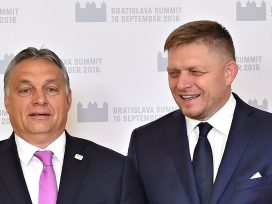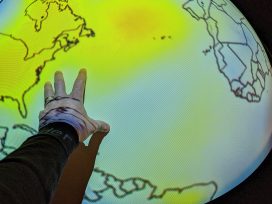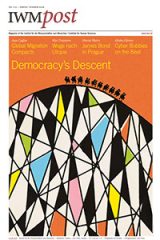

In collaboration with
Institute for Human Sciences
The Institute for Human Sciences / Institut für die Wissenschaften vom Menschen (IWM) is an independent institute for advanced study in the humanities and social sciences. Since its foundation in 1982, it has hosted more than 1500 scholars, journalists and translators from all over the world. Many of the Institute’s Permanent and Visiting Fellows are regular contributors to Eurozine or its focal points The World in Pieces and Ukraine in European Dialogue (see below).
Website: www.iwm.at
X (formerly known as Twitter): https://x.com/iwm_vienna
Youtube: https://www.youtube.com/channel/UCIwFQ_iRX8w8D0NKJo41Ihw

Articles

Literary expressions of grief across the ages use representations of nature as soothing metaphors. But rarely does the death of non-human life merit a thanatography. Could literature that finds a non-anthropomorphic means to grieve for other sentiment beings provide our desperately needed resensitization to the natural world?

Europe is facing not only Orbán’s autocratic turn but also that of his ‘apprentice’: Slovakia’s prime minister, Fico, has taken an advanced course in attacking his country’s judiciary, media and cultural institutions. His first goal: to get away with it, say beleaguered intellectuals, theatre directors, political scientists and investigative journalists from Bratislava.

Unlike the political challenges and wars of the past, the climate and environmental crisis we now face is universal. Yet green movements remain on the political periphery and continue to be viewed in narrow, reductionist terms. What kind of solidarity can unite the emerging ecological class?

The visions of an apocalypse peddled by nihilistic humanists and misanthropic transhumanists confuse the destruction of humankind with salvation.
Focal points

Inspired by a lecture that Clifford Geertz delivered in 1995 at the Institute for Human Sciences in Vienna, this focal point engages with ‘deep diversity’, ‘a sense of dispersion, of particularity, of complexity and of uncenteredness’ rather than unified world order. It follows the launch of a research programme of the same name at the institute in January 2023.

Post-revolutionary Ukrainian society displays a unique mix of hope, enthusiasm, social creativity, collective trauma of war, radicalism and disillusionment. With the Maidan becoming history, the focal point ‘Ukraine in European Dialogue’ explores the new challenges facing the young democracy, its place in Europe, and the lessons it might offer for the future of the European project.
Projects and publications

